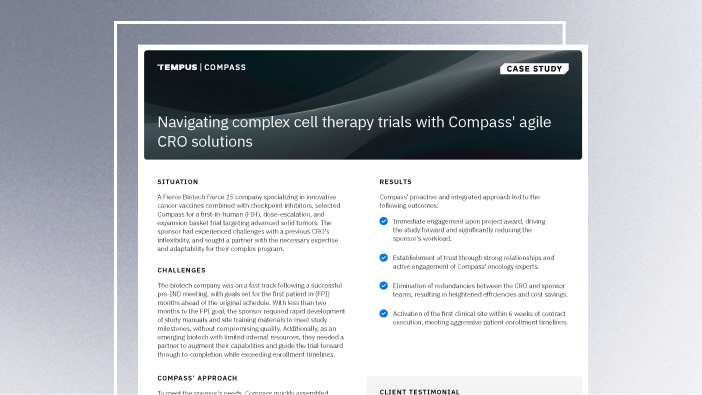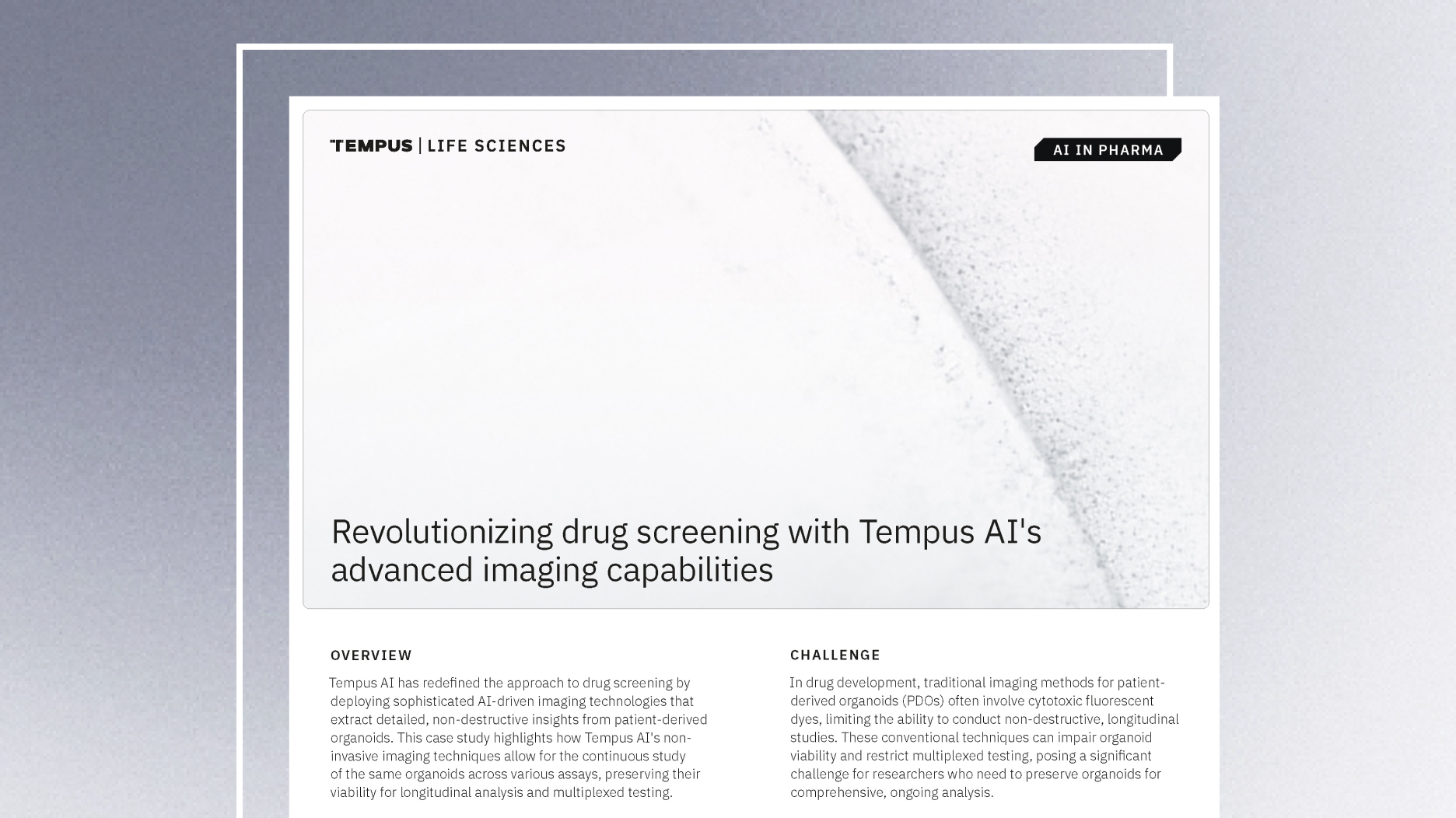-
PROVIDERS
Introducing the Immune Profile Score
Explore the science behind the IPS test, a prognostic biomarker for patients on ICI therapy
-
LIFE SCIENCES
Introducing the Immune Profile Score
Explore the science behind the IPS test, a prognostic biomarker for patients on ICI therapy
-
PATIENTS
It's About Time
View the Tempus vision.
- RESOURCES
-
ABOUT US
View Job Postings
We’re looking for people who can change the world.
- INVESTORS
06/03/2024
Q&A: Using AI to identify and close gaps in care for cancer patients
Navigating the dynamic landscape of FDA approvals and complex clinical guidelines is an ongoing challenge for healthcare providers.
Authors
Ezra Cohen, MD
Chief Medical Officer of Oncology, Tempus

Karen Huelsman, MS, LGC
Precision Oncology Lead and Genetic Counselor at TriHealth Precision Medicine Institute serving TriHealth Cancer and Blood Institute

Chief Medical Officer of Oncology, Tempus

Karen Huelsman, MS, LGC
Precision Oncology Lead and Genetic Counselor at TriHealth Precision Medicine Institute serving TriHealth Cancer and Blood Institute

Recently, Ezra Cohen, Chief Medical Officer at Tempus, sat down with Karen Huelsman, Precision Oncology Lead and Genetic Counselor at TriHealth, to discuss the implementation of Tempus Next as a tool to streamline the adoption of precision care pathways. Learn more about how Tempus Next assists TriHealth’s physicians in adhering to best practice, guideline-directed testing for NSCLC patients, and how the integration of AI algorithms and multi-modal data enhances patient care.
|
“Identifying patient care gaps without AI is challenging. Our partnership allows us to identify and close care gaps and we have seen an improvement over time. The Tempus Next program is great to have in place as a double check to ensure guideline directed care is accessible for all patients.” – Karen Huelsman, Precision Oncology Lead and Genetic Counselor at TriHealth Health System |
Hello, Karen, and welcome to our webinar. It’s great to have you with us. Could you start by telling us a bit about your role at TriHealth and how it intersects with Tempus’ initiatives? |
| Karen Huelsman: Absolutely, Ezra. I’m the Precision Oncology Lead and Genetic Counselor at TriHealth. My role is quite dynamic, involving both clinical and administrative responsibilities. I work closely with our lung cancer specialists, and together we’re deeply involved in projects like Tempus Next. My job is to ensure that our medical oncology providers have the genomic information they need for clinical decision-making. I also handle quality metrics for precision oncology and advocate for EMR integration across various labs. |
Precision medicine is pivotal at TriHealth. What challenges do you face in its implementation, and how are you overcoming them? |
| Karen Huelsman: The challenges are manyfold, Ezra. We’re navigating complex guidelines that change often, provider fatigue and burnout, and we want to measure and improve adherence to new guidelines for biomarker testing. We are working toward clinical support that provides relevant guidance at the point of care to streamline workflow for our providers and allow more time for patient care. AI tools like Tempus Next are a game-changer, structuring patient data and delivering actionable insights right at the point of care, making implementation operationally easier. |
Before the integration of Tempus Next, how did TriHealth address gaps in care? |
| Karen Huelsman: Before Tempus Next, we relied on the discrete genomic variance in EPIC, creating reporting dashboards and clinical decision support for our providers. However, we hit a wall when it came to capturing all the necessary information, especially identifying resectable patients. When we engaged with Tempus and conducted a retrospective analysis of our data, it was humbling to discover we had a 30% care gap, despite our best efforts. Tempus Next allows us to assess clinical data more effectively and support clinical decisions, in a way we couldn’t before. |
What aspects of Tempus’ AI-enabled Next solution excite you the most? |
| Karen Huelsman: There are several, Ezra. The ability to identify patients that we otherwise could not and the AI-enabled data structuring that contextualizes clinical records are particularly exciting. The notifications at the point of care, operational ease of implementation and potential for automation are also significant advantages and have been transformative for our institution.
The automation of these systems also means that every patient’s clinical data is evaluated objectively, without implicit human bias or variability. A uniform application of the same algorithm to all patients helps to ensure that everyone receives the same high standard of care, regardless of their background. It’s a powerful way to standardize testing and treatment protocols, which can ensure equitable health outcomes. |
Could you share a patient story that illustrates the impact of the EGFR care gap program? |
| Karen Huelsman: Certainly. One of the first cases we had right after the launch of Tempus Next involved a patient who was flagged for biomarker testing. In this case, the provider, who isn’t a lung specialist and manages a wide variety of cancer types, received a timely reminder through Tempus Next about a patient’s need for biomarker testing. Another provider expressed her gratitude for the nudge, saying, “I appreciate the reminder. I’ll put that on my to-do list for when the patient comes in next week.” The test was ordered 6 days later, and the patient was found to have a PD-L1 positive result, which is invaluable for clinical trial decision-making and therapy determination. The provider acknowledged the value of Tempus Next as a safeguard to ensure that such crucial testing is conducted. It was a clear demonstration of how Tempus Next can close care gaps and provide notification to accelerate the adoption of precision medicine standards. |
|
“Tempus ingested our clinical data and returned insights to support decision making – and did it faster than we could have independently. That was a win.” – Karen Huelsman, Precision Oncology Lead and Genetic Counselor at TriHealth Health System |
What advice do you have for other health systems looking to improve their precision medicine programs? |
| Karen Huelsman: My advice is to start by understanding AI platforms like Tempus Next. It’s important to have a dedicated individual who can manage the integration and communication between the AI system and healthcare providers. You also need alignment with providers and be open to measuring and improving upon current practices. |
How do you see AI becoming an integral part of patient care at TriHealth? |
| Karen Huelsman: AI is set to become a cornerstone of patient care at TriHealth, helping us meet accreditation goals, streamline workflows, and ensure compliance. It’s also a powerful tool for supporting health equity in tumor biomarker testing. AI applies algorithms objectively to clinical data, which promotes equitable testing and treatment across all patient populations. |
Can you tell us more about the quality metrics and analytics that Tempus Next has helped you with? |
| Karen Huelsman: Sure, Ezra. Tempus Next has been instrumental in providing data we track for our Commission on Cancer program goals. It allowed us to perform quality checks and obtain the necessary information much more quickly than if we did it manually. This capability is a significant advantage helping us to measure baseline and demonstrate improvement in our quality metrics over time, which is essential for accreditation and the overall quality of patient care. |
-
11/13/2024
Navigating complex cell therapy trials with Compass CRO
Learn how Compass provided CRO services for a biotech’s first-in-human, dose-escalation, and expansion basket trial targeting advanced solid tumors.
Read more -
10/17/2024
Precision pathways: Insights & strategies to navigate regulatory requirements for oncology diagnostics
Watch as we explore the evolving regulatory landscape of diagnostics in oncology. Gain insights into new regulatory requirements, submission pathways, and emerging trends. Learn from industry experts about strategic approaches to FDA requirements to help inform your diagnostic development and precision medicine pipelines.
Watch replay -
10/11/2024
Revolutionizing drug screening with Tempus AI’s advanced imaging capabilities
Learn how Tempus AI's noninvasive imaging techniques allow for the continuous study of the same organoids across various assays, preserving their viability for longitudinal analysis and multiplexed testing.
Read more


